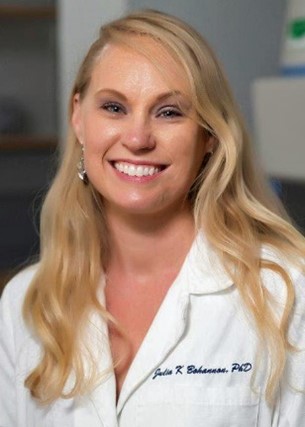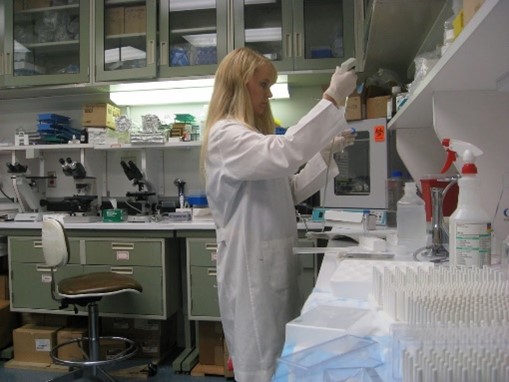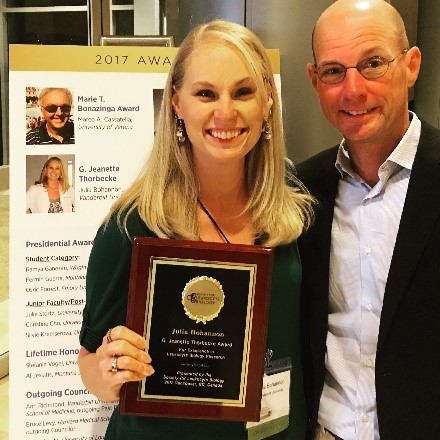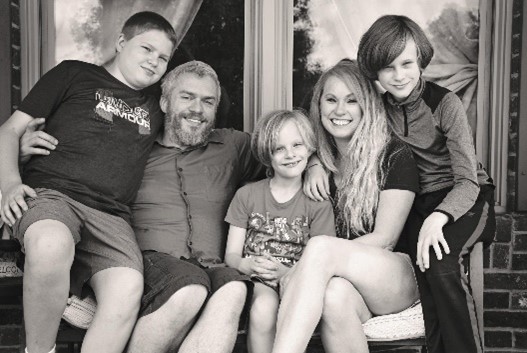“If I was going to do science, I wanted it to help people,” says Julia Bohannon, Ph.D., an assistant professor of anesthesiology at Vanderbilt University Medical Center in Nashville, Tennessee.

Dr. Bohannon researches therapies that could help prevent infections in patients with severe burn injuries. Infections are common in these patients because burn injuries typically suppress the immune system. Dr. Bohannon originally planned to become a burn surgeon, inspired by the doctor who treated her after she was severely burned as a child. But during her junior year of college at Eastern Kentucky University in Richmond, she started working in a genetics lab and enjoyed it so much that she began considering a research career.
Choosing a Path Forward
After graduating with her bachelor’s degree, Dr. Bohannon worked for 2 gap years in a translational research lab at the University of Kentucky to decide between pursuing an M.D. or a Ph.D. She ultimately entered a Ph.D. program at the University of Texas Medical Branch in Galveston and conducted research in the lab of Tracy Toliver-Kinsky, Ph.D., at the Shriners Children’s burn center. Upon earning her Ph.D., Dr. Bohannon took a postdoctoral position with Edward Sherwood, Ph.D., at the University of Texas Medical Branch, where she studied potential treatments to improve immune cell function after burns. To continue her work, she followed Dr. Sherwood a year later when he moved to Vanderbilt University Medical Center.
Starting a Lab

In 2015, Dr. Bohannon was promoted to a faculty position at Vanderbilt. Shortly after, Dr. Sherwood encouraged her to apply for an NIH grant to start her own lab. While Dr. Bohannon thought it was unlikely that her research would be funded at such an early stage in her career, she felt very strongly about the research and decided to move forward with the application. She anticipated criticism from reviewers regarding all her training being focused on burn research rather than branching out into different areas, but she knew the scientific feedback would be helpful to improve her chances of success in later grant submissions.
The reviewers ultimately saw the value of her work, and NIGMS funded her grant on that first submission, beginning in 2017. “I rank the day that I got the news about my first R01 up there with my wedding day and the births of my children,” she says. She adds that later receiving an NIGMS Maximizing Investigators’ Research Award (MIRA)—a grant that provides greater stability and flexibility—in 2021 was equally exciting.

Dr. Bohannon’s R01-supported research focused on determining how molecules called toll-like receptor (TLR) agonists enhance the immune response after severe burns. “Right now, infection is the number-one cause of death in burn patients,” says Dr. Bohannon. “TLR agonists are one way we could potentially reverse that.”
She’s using her MIRA funding to further study TLR agonists, including how they affect immune cells taken from human burn patients. She’s also working to better understand how burn injury itself affects immune cells. Her goal is to see TLR agonists in clinical trials as immunomodulators to prevent infections.
Mentorship and Motherhood
Dr. Bohannon credits her success to having excellent mentors and has made mentoring students a priority. She’s especially passionate about supporting graduate students who are or want to be parents. “I’ve had a lot of women ask me for advice on how to be a mom and pursue a career in academia, and it’s been a really cool experience to be able to share that with students and trainees,” she says.

When Dr. Bohannon was pursuing her Ph.D., she recalls that students were often discouraged from starting families before they graduated. She even heard that some mentors wouldn’t take on students who had children or were pregnant. Mindful that she wanted to start a family, she chose a doctoral advisor who had had her first child during her own training and was very supportive of Dr. Bohannon’s desire to have children.
Dr. Bohannon had two sons as a Ph.D. student and a third as a postdoc. She emphasizes the importance of maintaining a healthy work-life balance as a parent. That balance has only aided her career, if the range of awards she’s received—including the Society of Leukocyte Biology’s G. Jeanette Thorbecke Award and a professional achievement award from Eastern Kentucky University’s International Alumni Association—is any indication. “I truly am living my dream job right now,” she says. “This is what I’ve always wanted to do, and it’s incredible.”
Dr. Bohannon’s research is supported by NIGMS grant R35GM141927.

